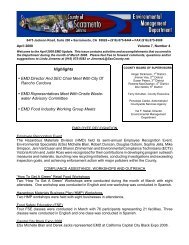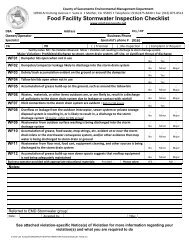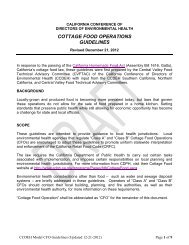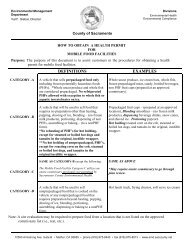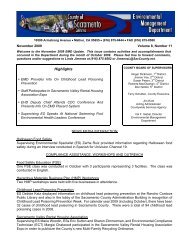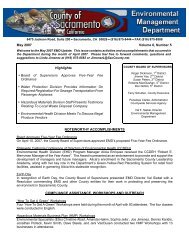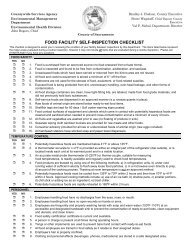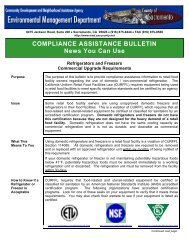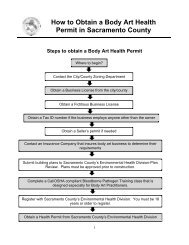California Water Well Standards, DWR Bulletin 74 ... - County of Glenn
California Water Well Standards, DWR Bulletin 74 ... - County of Glenn
California Water Well Standards, DWR Bulletin 74 ... - County of Glenn
- No tags were found...
Create successful ePaper yourself
Turn your PDF publications into a flip-book with our unique Google optimized e-Paper software.
d. ~c.water shall be used if less sand than 2 parts sand per one part cement byweight is used. Additional water may be required when special additives, suchas bentonite, or 'accelerators' or 'retardants' are used.Concrete. Concrete is <strong>of</strong>ten useful for large volume annular seals, such as inlarge-diameter wells. The proper use <strong>of</strong> aggregate can decrease thepermeability <strong>of</strong> the annular seal, reduce shrinkage, and reduce the heat <strong>of</strong>hydration generated by the seal.Concrete shall consist <strong>of</strong> Portland cement and aggregate mixed at a ratio <strong>of</strong>at least six-94 pound sacks <strong>of</strong> Portland cement per cubic yard <strong>of</strong> aggregate.A popular concrete mix consists <strong>of</strong> eight-94 pound sacks <strong>of</strong> Type I or Type IIPortland cement per cubic yard <strong>of</strong> uniform 3/8-inch aggregate.In no case shall the size <strong>of</strong> the aggregate be more than 1/5 the radial thickness<strong>of</strong> the annular seal. <strong>Water</strong> shall be added to concrete mixes to attain properconsistency for placement, setting, and curing.Mixing. Cement-based sealing materials shall be mixed thoroughly to provideuniformity and ensure that no 'lumps' exist.Ratios <strong>of</strong> the components <strong>of</strong> cement-based sealing materials can be varied dependingon the type <strong>of</strong> cement and additives used. Variations must be approved by theenforcing agency.3. Bentonite. Bentonite clay in 'gel' form has some <strong>of</strong> the advantages <strong>of</strong> cement-basedsealing material. A disadvantage is that the clay can sometimes separate from the claywatermixture.Although many types <strong>of</strong> clay mixtures are available, none has sealing propertiescomparable to bentonite clay. Bentonite expands significantly in volume whenhydrated. Only bentonite clay is an acceptable clay for annular seals.Unamended bentonite clay seals should not be used where structural strength <strong>of</strong> theseal is required, or where it will dry. Bentonite seals may have a tendency to dry,shrink and crack in arid and semi-arid areas <strong>of</strong> <strong>California</strong> where subsurface moisturelevels can be low. Bentonite clay seals can be adversely affected by subsurfacechemical conditions, as can cement-based materials.Bentonite clay shall not be used as a sealing material if roots from trees and otherdeep rooted plants might invade and disrupt the seal, and/or damage the well casing.Roots may grow in an interval containing a bentonite seal depending on surroundingsoil conditions and vegetation.Bentonite-based sealing material shall not be used for sealing intervals <strong>of</strong> fracturedrock or sealing intervals <strong>of</strong> highly unstable, unconsolidated material that could collapseand displace the sealing material, unless otherwise approved by the enforcing agency.Bentonite clay shall not be used as a sealing material where flowing water might erodeit.Bentonite clay products used for sealing material must be specifically prepared for suchuse. Used drilling mud and/or cuttings from drilling shall not be used in sealingmaterial.-19-



